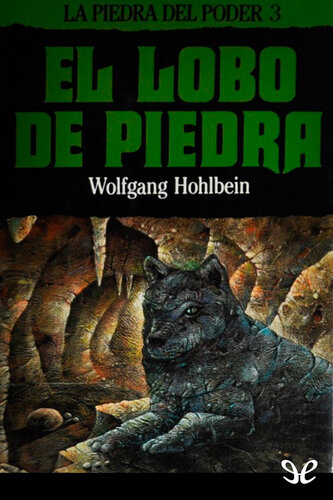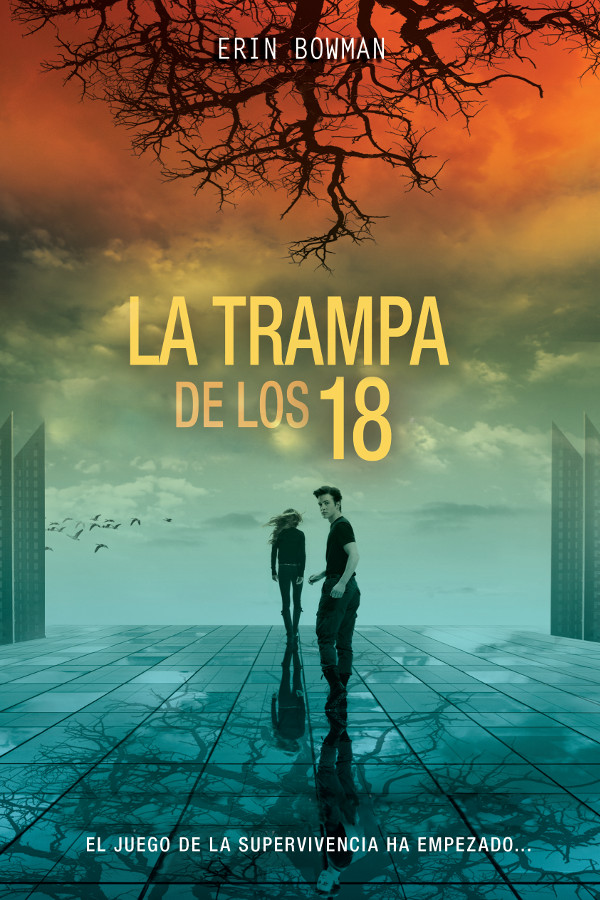oleebook.com
El proyecto del hombre lobo de Clifford, Simak D
de Clifford, Simak D - Género: Ficcion
Sinopsis
Clifford, Simak D Year: 2009
Libros Recomendados - Relacionados
Reseñas Varias sobre este libro
This was actually a much more enjoyable book on this re-read than it was on the first reading. A lot of that is a mood thing, I know, but The Werewolf Principle is an odd sort of book in a lot of ways.
This classic sci-fi novel has an elegant old-school writing style that is philosophical and in a way insular; it is very much a first person point of view and that person is a synthetic man. The goals of the book seem more philosophical and exploratory than thrilling, so the title ends up feeling a bit misleading if you do not start out knowing what it is about. The narrative meanders through self analysis, self doubt and the boundaries of humanity, what we are, what we could be. There is no screaming and rending under the full moon.
Our main character, Andrew Blake, was discovered in cryogenic sleep in outer space, no one is sure who he was or how he got there, least of all himself. Slowly Blake's fascinating story emerges along with the information that he is not all alone in his mind.
While the story is inclined to waffle on a bit, at times, and the philosophy of Thinker can be a bit dated, on the whole it is a very satisfying story with a surprisingly decent ending.
The werewolf principle of the title relates to a bioengineering term in the book which allows 'open end' changing of androids/synthetic men to allow to incorporate characteristics of alien races they come into contact with to better understand them. One of the aliens that gets incorporated resembles the human myths of wolves (extinct in this future scenario) and people react accordingly.
If you are wondering whether this is a modern Gothic/modern horror type werewolf story, it is not; aside perhaps from the questioning of identity and instinct that often comes in more mainstream werewolf stories. So, anyone reading it for horror purposes is ly to end up very dissatisfied. When reading for classic sci-fi purposes however, it is really quite good.2017-reading-challenge classic-sci-fi19 s Jim2,199 715
I am beginning to Clifford D. Simak more and more. His Way Station was magnificent, and The Werewolf Principle, while not so good, has moments of sheer brilliance -- plus a brilliant ending.
Two hundred years before, man created an android for space exploration. It was not according to plan, but this android became three creatures in one: the human, called Changer, who contained a mind transfer of a brilliant earth scientist; a kind of wolf with arms, called Quester; and a somewhat amorphous almost purely intellectual creature, called Thinker. When the android comes back to earth, he is hunted down.
I won't say here what happens, but it is a great ending, perhaps Simak's best:Earth wanted to get rid of him, perhaps afraid of him, perhaps merely disgusted by him, a loathsome product of its own ambitions and imagination that must be quickly swept underneath the rug. For there was no place for him on the Earth or in humanity, and yet he was a human product and had been made possible by the nimble brains and the weasel understanding of Earth's scientists.Of particular interest are a group of extraterrestrials that live on earth, but not among humans. They look fairy tale weasels with pockets and are called Brownies.
The story takes a while to really get started, but when it does, the book quickly goes from a three-star to a four-star read.
scifi17 s Paul Weiss1,333 371
40 years old and more current than ever!
Upon turning the final page of this powerful novel, 21st century readers of THE WEREWOLF PRINCIPLE will ly set the book down slack-jawed with amazement at Simak's thoughtful, prescient exploration of genetic engineering, a scientific field of endeavour that, unheard of a scant 40 years ago, now reaches front page headlines on a regular basis.
Space travel as technology is now several hundred years old. But, currently debate is raging in the Senate over a proposal for a program of bio-engineering as a basis for the colonization of other solar systems. Is it better to force the planet to fit the man through terra-forming or to bio-engineer the man and mold his abilities to withstand hostile alien environments? There are those that feel the results of such a modification would somehow be less than human or may even be perceived as a monster.
But neither side to this debate is aware of Andrew Blake. Two hundred years earlier, this problem had already been faced and resolved at that time by producing a synthetic human - an android with the imprint of a fully human mind that would be capable of absorbing the form and mind of any alien culture it might encounter. The mission that carried Blake to the stars had been lost and the Space Administration reached the decision to formally bury any reference to the project as a regrettable failure! Luck and happenstance have now returned Blake to earth into the middle of the current debate and the world is shocked to learn of the flaw in their 200 year old experiment - the "data" from the absorption of an alien mind could not be erased. Blake is now an amalgam of three wildly different alien personalities able to interact and communicate with each other but within a single body.
Under the circumstances, Blake, of course, becomes the lightning rod "poster child" for BOTH sides of the debate. Even Blake himself is puzzled and questions both his humanity and his place on earth.
THE WEREWOLF PRINCIPLE is a trademark Simak blend of soft and hard sci-fi, crafted in his low-key softly stated pastoral Midwest style that cannot fail to amaze any thinking reader. The ending of the novel not only contains a blind-side twist worthy of the finest thriller but is also warmly romantic and intelligently optimistic without being trite or gushy. With standards this to live up to, it is a miracle that contemporary writers of science fiction can actually make a living!
Paul Weissscience-fiction16 s Cheryl10.7k 454
Second (or third?) read. My previous review still stands. This time I want to add that the poetry of the writing surprised me. Lots of beautiful imagery and stylings... not purple prose, and easy to overlook in one's quest to figure out what's going on in the plot and with the characters, but definitely well-crafted.16 s Nate453 20
Snatched from the ice hard stars that roofed a planet of drifted sand and snow-the ideas and the thoughts and concepts that clung to all the pictures, bits of dirt to roots.
This is my fifth book from the great Clifford Simak and runner up to Asimovs the gods themselves for that years Hugo award.
Simak has a way of writing and incorporating ideas and technological concepts that dont seem wild now but were not as present in the works of his contemporaries. Smaller things a house that is run by an ai system, constantly giving him reminders and updates to annoying and humorous effect to uploading human minds to a server where they continue to exist and can be copied. Those copies, given different experiences over time become their own person. Those minds can even be uploaded into cloned bodies that have super human abilities. Is that being still a person? Is it human?
Could the mind be man? Or was the mind a lonely thing that stood apart from man? How much of man was mind, how much was the body? Andrew Blake struggles with these questions when he comes to the realization that he has within himself, two other, alien beings who he can mentally converse with and physically change into.
Simaks writing quality is said to vary quite a bit in his later career but aside from an overly contrived ending I think it stands with some of his best work.science-fiction-masters-degrees si-fi10 s Bill1,744 95
Back in my university days, I took a Science Fiction novel course. One of the books we read was City, a story of the future where all that remains on Earth are dogs and robots. A beautiful, engaging, touching story. For some reason, I've never read another Simak book, until this past week. The Werewolf Principle, written in 1968, was a lovely surprise. In the future, mankind sent ships into space to search the universe for habitable planets. Along with the ships were two unique humans (maybe telling you their uniqueness might take some of the joy of discovering it for yourselves, so I won't elaborate). Suffice it to say, that one of them returns to Earth, discovered in hibernation in a capsule. Andrew Blake arrives, suffering from amnesia. Slowly he discovers himself and how he has changed over this 200 year journey. He is now more than Andrew Blake. Discovering how he has changed is part of the joy of this book; such an imaginative concept. I found myself saying 'Wow' many times. The book is thoughtfully crafted, intelligently written and the story and characters are all interesting and engaging. It's so nice exploring Science Fiction again, the imagination and the stories. I do how Simak views the future, some concepts the living homes are fascinating, and, yet, people still use coins and public phone boxes. I also d the Brownies, the beings from another world who have settled on Earth and keep an eye on things. Everything about this story was fascinating. I had originally given it 4-stars, but as I write about it and think about it, it deserves more than that. It intrigued me, brought out emotions, both happy and sad, and just totally grabbed me, from beginning to end. It won't take me 40 years to read another Simak story.sci-fi top-ten-201610 s ???????? ????????582 80
????? ??????? ??????????, ??????? ?? ?? ? ?? ???-??????? ????? ?? ??????? ??????! ??? ???????? ???????????? ????????? ?? ????? ?????, ????? ? ???????? ? ?????? ? ???????? ?????? ? ?????? ?? ??????. ??? ???? ??????? ??????? ????? ?? ?? ? ???????, ????? ? ?? ? ???????? ????? ????? ? ?????????... ?? ????????? ?? ???? ??? ???????? ???????????? ???????? ? ????? ???????? ? ??????? ??????? ????? ????, ????? ?? ?????? ??????????????. ????????????, ???????? ????? ????????, ?? ???????? ???????????? ?????????? ?? ??? ????????, ???? ????? ?????, ??? ? ???? ???? ????????? ???????? ? ????????? ????, ??????????? ????. ????? ?????? ?? ??????? ??????? ?? ?????? ??????, ?????? ????? ?? ??????? ? ?????? ???????????...
??????? ?????? ????????, ???? ??? ??????????????, ????? ???? ????? ?? ???????. ?????? ??????? ?? ?????? ?? ???? ????????? ?? ???????????????, ?? ?? ??? ? ?????? ?? ?????? ? ?????? ??????? ????, ???? ?? ?????? ?? ??????? ???? ???? ??, ?????? ???? ?????????. ?? ???????????? ?????????, ??????????? ???? ???? ?? ? ????? ?? ???????, ???? ?? ????????, ?? ?????? ???? ?? ??????.9 s Ian441 121
3.4 ?
Considering that he's such a major name in science fiction, I haven't read a lot of Clifford D Simak's work ( that I recall - an important caveat).
"Way Station" certainly; "Good Night, Mr. James"- which was turned into a particularly scary episode of The Outer Limits. I suspect I've read more of his short stories in anthologies but don't remember them by title.
So it's past time I paid attention to this author.
"The Werewolf Principle" is an inventive, if mildly dated tale about a man who's not sure who (or how many) he is, exactly.
A man is found floating in a suspended animation capsule around an alien world. He's returned to Earth and revived but can't say who he is and no record can be found. Later he experiences curious blackouts, after which he can't account for his actions.
Some of the themes Simak deals with are the morality of genetic engineering and the individual cost of exploration/expansion. He also gets a bit cosmological, dropping hints of a guiding intelligence in the universe but that idea is not fully developed.
For short novel there's a fair amount to it. My one complaint would be that the ending was pat and predictable. Still a pleasant enough tale and well told.
-30-8 s2 comments Rose795 48
Simak has written some of the best science fiction out there. Way Station and City were both fantastic. The Werewolf Principle was not.
It takes place in the future. Scientists had created a humanoid being with the ability to morph into something else so we could send it out into space and if it found a planet with life, it could morph to match it. Which is what happened but it ended up coming back to Earth as three beings all living within the same body. Werewolf...get the comparison? Anyhow, a huge amount of the story was introspection and it was duller than watching paint dry. I made it half way before I decided it wasnt worth the effort.
science-fiction6 s Cheryl10.7k 454
One of the more universally appealing Simak, perhaps. Many of the ideas could have been conceived by other writers. But only Simak's House would have offered not-wallpaper that's a collage of thousands of eyes, when requested to change it from a woodland scene featuring a bunny, and only Simak's Kitchen would have pouted because the resident asked for ham'n'eggs instead of lobster thermidor. And only in a Simak novel would our hero go (trout?) fishing and wind up feeding most of his picnic to a not-Brownie. And even the politics were interesting, how the two Senators from the US had to come to agreement or one would be forced to resign....
Lots of ideas here slowed me down from total immersion, but I reveled in them rather than resented them. If you're anything of a Simak fan, don't miss this. If you happen to be in the mood for some older SF that's a little different, do consider it.5 s Tom Loock688 10
Was it just to surprise myself when I chose to re-read The Werewolf Principle by Clifford D. Simak?
I have pleasant memories of reading a couple of Simaks at the same time in the 70s and picked this one at random for a revisit.
Though published in the 1960s, it reads more a 1950s novel when it comes to multiple predictions about the future (yes, the ever-popular flying cars and space travel, though people still have to walk across the room to answer a phone with optional visuals) and the then popular small cast of characters, but - that's just at first glance. As with many of Simak's stories, there is more to it.
In essence Simak is a down-to-earth (sorry, couldn't resist that with a SF-writer) man from rural Wisconsin born 110 years ago who began publishing in the 30s. He was a humanist through and through, and a religious man though the latter has never caused an atheist myself any problems.
I hate and will always avoid spoilers, so suffice to say, the unfortunately since misleadingly titled 'Werewolf Principle' is about an astronaut returning to Earth and about harmony between multiple species.
I recommend Simak in general, and count this one among his better books; though it is dated, it has a certain charm.
ebook have-re-read sf4 s Roddy Williams862 38
'In the middle-distant future, Andrew Blake, discovered on a distant planet huddled inside a capsule, is brought back to Earth suffering from total amnesia.
Over 200 years old, he thinks and acts a man but becomes frighteningly aware of two alien beings that lurk within his body a strange biological computer and a wolf- animal. With the latter in control he breaks out of hospital to look for his past '
Blurb from the 1977 Pan paperback edition
Several hundred years hence, Man has colonised the nearer stars. A political debate is in progress in which Senator Chandler Horton is proposing to abandon long-term and expensive plans for terraforming in favour of adapting humans to fit the planets. His rival, Senator Solomon Stone is taking the exact opposite view, suggesting that standard humans would regard such adapted people as abhorrent monsters.
Into this world Andrew Blake awakens, a man with no knowledge of his past, and whose worldview seems to be two hundred years behind everyone elses.
In this somewhat surreal future, men wear kilts and robes, houses fly about to settle in whatever plot takes their residents fancy and (quite annoyingly, one imagines) the various rooms have different personalities and argue with each other over what is best for their occupants.
Blake soon becomes aware of blackouts, after which he finds himself naked in the countryside. He subsequently meets a Brownie (a small rodent- alien whose species has taken up residence in Earths countryside) who asks him how many of him there are.
The question only makes sense to Blake when he is exposed to the realisation that not only does he share his mind with two aliens, but that he is also a shapeshifter and can transform into their alien bodies.
These three distinct personalities are called Changer (Blake himself), Quester (a large wolf- creature) and Thinker (an amorphic sexless entity which seems no more than an emotionless biological computer).
Unable to control the triggering of his shapeshifting, Blake goes on the run after his Quester form is seen and travels through an unfamiliar America two hundred years ahead of the background knowledge he has in his mind.
Its interesting that Simak has chosen these archetypal personalities which seem to relate to classic views of the consciousness divided into Id, Ego and Superego, the wolf element being the subconscious, Blake being the conscious and Thinker being the level at which rational logic and calculation process facts. Quester also has the ability to sense life on other worlds but lacks the intellect to analyse what he finds.
This is late Simak and for the time it was written, seems somewhat dated, having a flavour and style more suited to the Fifties. It is not short of ideas, however. Simak engages in the debate over terraforming versus humanforming and we are introduced to the Mind Bank, a repository of worthy human minds, which have been uploaded into a storage device and exist as both individuals and a gestalt consciousness.
Indeed, the central theme is one of identity and (in the Dickian sense) what it means to be human.
Blake ultimately discovers himself to be just a copy of a human mind, long dead. Quester and Thinker also deduce that their original bodies were destroyed since Blake is an android de4signed to scan and mimic alien species for Research purposes, one of only two constructed and sent out to alien worlds two hundred years ago.
Later, he finds that another copy of his consciousness exists in the Mind Bank. There is a strange anachronistic scene near the end where his disembodied self rings Blake up on the telephone. The denouement is satisfying although one suspects that Simak is trying to explore an idea which should have been introduced earlier.
The three personalities begin the process of assimilation in order that Blake can exist as one consciousness. Blake returns to space to search for something that Thinker discovered from Questers sensing of space while they were (tellingly) in a country church; a thing Blake describes as a universal mind.
One cannot see that Simak is using this final chapter as some kind of Christian metaphor, although it could be read as such. Blake collapses into his Thinker form (behind a natural force field) in a church, and remains as good as dead until Elaine Horton (the senators daughter) comes to speak to him, generating a resurrection.
After a few days he ascends (in a ship) in search of God.
Despite its flaws it remains a book full of colour, atmosphere and wonder.This entire review has been hidden because of spoilers.Show full reviewamnesiac-hero androids artificial-intelligence ...more2 s Becca103
This was difficult to get into, there were chapters of vague introspection that were very boring. The main character spends a lot of time pondering philosophically but also has a completely 1 dimensional "romantic" relationship that feels out of place. I skimmed the last 40 pages.The ending was okay and explained some of the issues I had with the book. Ultimately I speed read the last 1/4 to just get it over with, and that has to be a 1 star.2 s Frank171 1 follower
Simak pens good sci-fi adventure stories. This one was much more cerebral, and there was a lot to digest and think about. The end could have used more expansion. It feels he ended it too quickly. Still, I am a Simak fan and this was worth my time.2 s DenisAuthor 1 book29
I especially d the philosophical bits at the end, but, as I expected, overall, not one of Simak's finest efforts.do-not-own2 s Rick Cook, Author64 7
(Confession: Ive never read any of Clifford Simaks work before, so my observations below might seem pedantic or too detailed, but they are truly my first impressions of his writing.)
A fish-out-of-water tale, this story about a spaceman with few intact memories returning to Earth took a while to get going. But at approximately one-third through the book, the hook was placed, and I could see the plot developing (finally). Given that this novel was published in 1967, I had to ignore some of the stilted dialogue and the (now tired) tropes of automated houses, robotic helpers, male chauvinism, and nonchalant expectations of great advancements in human health. But the core of this story is solid. I especially d the multiple POVs taken by the author, though at times they were more telling than showing and had long & winding passages, some beautiful, some unnecessarily meandering. The hooks placed by Simak intrigued me and reminded me of Piers Anthonys Orn novel, a tale well told from a nonhuman perspective (long before Piers ruined his reputation, IMO, with the ongoing Xanth series).
THE GOOD: In this book, Simak is quite prescient in his discussions about bioengineering and what DNA modifications might lead to (but to a very exaggerated effect), and that intrigued me enough to keep reading past page 50, when I thought I might give up on it, then page 75, and finally past page 100, when the seemingly disoriented chapters finally converged. So be patient with the book as its far from the quicker set hooks of modern day science-fiction.
THE BAD: At times, the character voices sound too similar, without enough distinction between the different personas as Id prefer; not bad but not great either. The love interest is not well developed and seems to stand in only as a vehicle for some decisions made later by the main (male) character, typical of sci-fi from the chauvinist 1960s & 1970s. Also, Simaks writing style is quite wordy and repetitious at times, causing my attention to drift. So, if youre looking for a thriller sci-fi drama or a hard science fiction tale, this is NOT it.
CONCLUSION: The theme of conscience and what makes an entity human gave me a deeper appreciation for Simaks writing. The book is balanced well between philosophical arguments and action sequences, but the material and writing style have not aged gracefully, IMO. For all its faults, the tale is an interesting journey into what makes for a human, and is a good introspective look at a classic sci-fi novel. It does make me want to read his best known work, City, and compare the two books.
science-fiction1 Ryan Southworth8
The creature halted, crouched low against the ground, staring at the tiny points of light that lay ahead, burning softly through the darkness.
So begins, "The Werewolf Principle" by Clifford D. Simak. Another recommendation from the C. J. Cherryh site, this author and title were new to me as well. The trajectory of my experiences with this method of finding new books to read is a good one: "Forerunner" was terrible, "The Ginger Star," better, and this one better still!
In brief, this is the story of Andrew Blake, a man found floating in stasis in the depths of space and then brought back to an earth aged two hundred years since his disappearance. His adjustments, however, are more than just technological/cultural. It seems that, while absent from his home on earth, something or someone has happened to Andrew and that despite appearances, he is no longer an individual human being. More minds than his own now dwell in his body a body that is changed as well in ways not immediately apparent, even to himself. Those other individuals reveal much about his past, but complicate his place in the future. How does a man blend with humanity whose own humanity is very much in doubt?
I often harass my wife that she enjoys books in which nothing happens. You know, fabulous characters have experiences and inner turmoil but theres no real action. No political struggle or battle or danger to really drive the plot. The pushback from my obvious (but partly true) stereotype is that my books are all action and no depth (I protest!). I confess that The Werewolf Principle falls more into Kynas category of plots and that, despite this, I enjoyed it. Theres really no action driving this story; its an engagingly written exploration of what it means to be human and, though it certainly has a story arc to it, much of the conflict in inward, not outward.
I would certainly look for another book by Simak. My biggest complaint is that his ending which I wont give away was a bit tidy for me. Im all about happy endings, but .
I've got other - if you're interested - on my blog at www.thisdadathome.com.1 Nawfal326 1 follower
Generally, I find Simaks novels to be uneven. Whether it is uneven in plotting, pacing, or execution, it does not really matter because the result is always somewhat of a rolling up and down read. This novel may be slightly more uneven than some of the others I have read, but its something I have learned to expect with Simak.
Simaks love for pastoral, middle-America farms and woodlands is once again present. It seems no matter the storyline or the characters, Simak will find a way to take the reader fishing. He will also tell you all about the woods nearby, the critters that roam those woods, the farmland across the way, and the hills that overlook it all.
The theme of the overall novel is about the meaning of the Self or what it is to be a mind. In this novel, Simak has BIVs. [Brain In Vat] This fact is a little unnerving because I swear Simak predates a lot of the academic inquiry. It is not just about BIVs, though. There is also a wrangling that the characters do with what it means to be human and what it means to have/be a self.
There is a very negative feeling that comes through the writing toward and about humanity. The main character, though full of knowledge and data, is also extremely emotional. Toward the end of the book, he basically makes a sudden decision that oh, humans will be mean to me, so bye, Im leaving. It feels ridiculously abrupt and nearly childish. I disd the unevenness and I definitely did not the sudden negative mood of the main character. This is NOT a bad read, certainly not at all. It just is not the high level of Simaks work.1960s science-fiction1 Altivo OveroAuthor 6 books17
Read many years ago, but well worth this second trip through. The writing is superb, both in terms of character development and detailed settings. The plot concept is fascinating and complex, fraught with social and ethical issues. If you don't already know the context, it may take you a while to figure out just what is happening. You'll get it in a while, so stick to it.
As is often the case with science fiction, even though Simak was writing this in the 1960s, he successfully predicts elements that would appear in future times. Amusingly, though, he missed the cell phone or something similar in terms of portable communication. Such devices were already being discussed and predicted as early as 1955, but the author has his characters some 200 to 300 years in our future being forced to hunt down and use public telephones. Granted, the telephones include video and are rather advanced, but they are still large and clunky and tied down to physical locations. This is not a criticism, of course, but an interesting sidelight.
Clifford Simak was a SFWA Grand Master and well worthy of that title. All science fiction fans should experience his works.science-fiction shape-shifters transformation-fiction1 Andi Chorley282 5
One of Simak's best. Highly recommended. Love the flying houses!1 Kelly McCubbin310 13
I love Simak. City and Way Station are absolute gems and I think he doesn't get enough attention. His voice is so strong and unique and is funnier than most of his level peers (with the possible exception of Robert Sheckley). That said, this is a minor piece straining to be a bigger one. Philosophical to a fault in a way that, unless your last name is Bradbury, you ought to leave a little less wrought.
Still, it's intriguing and very funny in parts. There is often an almost Looney Tunes-ish mania about his work, with houses arguing about their own wallpapers and diners using mechanical arms and conveyer belts to cook flapjacks.
An easy, fun read that doesn't quite pay off in the way it seems to be heading towards, but still worth a look.1 Cécile236 37
The story of an extraterrestrial schizophrenia... The main interest of this book lies in the dialogue between the three distinct entities that share the body of the hero, a former space explorer. The three include one human that has not been back to the Earth for centuries, and two alien beings from very primitive planets, that are suddenly thrown into an entirely mechanised society, in which houses fly and play nanny to their inhabitants. A fun read.science-fiction1 Keith1,820 6
Sad, Lonely
The storyline starts strong, rises slowly, develops well and then ... then ... basically unravels, threads of reason forced apart by melodramatic psycho-babble. It ends, or doesnt end, Im not really sure and by 90% I really didnt care. In the end nothing seems to matter.1 Jonathan601 15
He has the most engaging style, you could wallow in it a herd of hippos. Oh yes, what is the book ... Romance between machines on a future earth.1 Erik Graff5,070 1,239
As the Wikipedia notes: "In the future, it is easier to engineer man to fit an alien world, than to re-engineer the alien world to fit man."sf1 SciFiOne2,017 33
1977 grade A+
1995 grade B+
2012 grade A-scifi-fantasy1 Rog Petersen99 2
I never finish a Simak novel without thinking how he must have been a smart, sensitive, caring, nice guy with a really positive attitude, who genuinely loved humanity.1 Robert Gelms123 3
I See a Bad Moon Risin'
By Bob Gelms
Cue music: William Tell Overture
Cue Announcer: CLIFFORD SIMAK!!!!! A fiery rocket, with the speed of light, a cloud of dust and a hearty CLIFFORD SIMAK AWAY!!!!!!! Return with me now to those thrilling days of yesteryear, CLIFFORD SIMAK RIDES AGAIN!!!!!!
I have no problem admitting that Im a nerd and I to have nerdy fun. When I was in high school I read a number of Clifford Simaks novels. I truly enjoyed them. They were stand-outs. I admit that some of the more cerebral parts, I didnt get.
Well, a long time goes by and about six months ago I bumped into one of his books, Way Station. It was being released in electronic form. In fact, almost his whole catalogue was converted to electronic editions; I bought four of them, having it in the back of my mind to expose the great Clifford D. Simak to the readers of 365ink. I reviewed the brilliant novel, Way Station, about three months ago.
Today we will be looking at a towering novel packed with so many ideas you might have to read it slowly. Its The Werewolf Principle.
Dont let the title lead you down the primrose path of deceptive deduction. All is not what it seems. There are surprises around every corner. What I didnt get in high school relating to both of these novels, became abundantly clear when reading them as an adult. (The same thing happened to me with The Catcher in the Rye, but thats a story for another day.) For me, then, reading Clifford Simaks novels as an adult became something of a peak experience.
Far, far into the future, an experiment was carried out as a result of two scientific theories becoming reality: the capability to travel to distant stars and the capacity to manufacture android/human hybrids. Two were made and inserted into one of the capsules.
Many centuries into the future, one of the hybrids was found orbiting a distant star near Antares in the constellation of Scorpios. He was in suspended animation in one of the escape pods from his ship, was sent back to Earth in this state and revived in Washington DC. The only thing he remembered was his name, Andrew Blake, and general information about Earth, its people and customs.
Andrew Blake was something of a celebrity, a returning astronaut from the very distant past. He hooks up with a powerful Senator and eventually falls in love with his daughter. There is a catch in all this. There always is.
Before Blake was sent into the galaxy, he was genetically altered to adapt to alien surroundings. In this way, he could live on an alien world for a few years changing himself to look them then return to his ship and download from his brain all the information he had absorbed. Any alien characteristics would be deleted. It sure looked good on paper.
Heres the catch.
He had visited two remarkable alien civilizations and downloaded all the information he was exposed to. But all did not go according to plan. Somehow, Blake ended up with two alien presences in his brain. One was an astonishingly powerful biological computer. The other one was a little more primitive both in thought and behavior, a kind of shape shifter whose favorite form looked , but wasnt, a wolf.
Of course, Blake was there as well and sometimes all three consulted with one another in the silence of Blakes mind. Can you say, Telephone call for Carl Jung.
Blake wonders if there is any chance of living as a human when there are three beings living inside his body and hes not psychotic. Blake, himself, is living under a mild self-induced illusion that he is human, which hes not. Hes only partially human. He is very uncomfortable living on Earth and interacting with full humans who can only think about 100,000 times slower that he does.
The Werewolf Principle is an ingenious, wildly inventive and creative treatise on the philosophy of being human. What makes a human? Are you any less human if you are missing an arm? What if your arm is artificial? What if you heart is artificial? How much of you has to be artificial for you not to be considered human anymore? 60%, 52%, 40%?
What if you start out artificial and gradually add biological parts? What if the only biological part of you is your brain? That will be a reality in a few hundred years. Chew on that one for a while.
Clifford Simaks, The Werewolf Principle, is a thought provoking story about where we are going as a race of people and by that I mean the human race. The plot drives forward a speeding truck and youll find yourself rooting for the characters. I had the best time reading it and I am sure you will too.
Mike273 12
It was Book Riot or a similar site that must have suggested this book. Prior to that I had not heard of this book or the author. Amazing since Clifford D Simak has 3 Hugos and is a SFWA Grand Master.
The story centers around Andrew Blake, an astronaut who has been recently brought back to Earth after being found in a cryogenic state floating in a space capsule. He is struggling to adapt to new technologies and ways of life that were not present when he left the planet.
In addition to the challenge of adapting to life back on Earth (early reveal and on most writeups of the book), Blake finds his mind is home not only to his thoughts, but houses two other alien presences. Of the three minds inhabiting Blake we find two extreme forms. The Thinker which is an alien form that embraces pure logic and data. It is formless, lives to think and lacks emotion and any appreciation for beauty and wonder. In contrast to Thinker is Quester. Quester is a more spontaneous and emotional entity that appreciates the mystical and the wonderful. It feels no need to ruin it with logic. I am not sure if Sisak meant to contrast Blake (and thus humanity) as a balance between raw emotion and raw logic, but that is how I read much of the story.
The book is briskly paced moving through an enjoyable story that touches on the idea of what is it that makes a creature human.
One of ways it explores this topic is through genetic engineering. It is not nearly as expansive and detailed as the third part of Seveneves, but does pose questions how much tinkering and changing can be done before the newly engineered creature is no longer human?
Another theme, often explored in Black Mirror, deals with human consciousness. The book focuses on the relationship between the mind and the body. Is a person a combination of the mind and body? If a mind can exist outside a body is it still human?
If that were not enough there is also an element of the story that touches on the complexity of what it will take to tackle a "Theory of Everything" or Grand Unified Theory to explain the mysteries of the universe.
This was a solid 3.5 but I rounded up.science-fiction Kit24 6
Autor del comentario:
=================================












